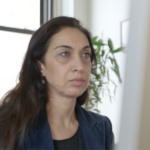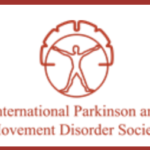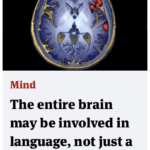News & Events
2023
 14th Annual Sense-ation! Gala: Dr. Simonyan and Her Lab's Research on Laryngeal Dystonia (Spasmodic Dysphonia) Are Featured
14th Annual Sense-ation! Gala: Dr. Simonyan and Her Lab's Research on Laryngeal Dystonia (Spasmodic Dysphonia) Are Featured
View video highlighting our research and inspiring patients here
Laryngeal dystonia (LD) is a rare disorder affecting the vocal cords. Dr. Sarah Camargos sits down with Prof. Kristina Simonyan while she breaks down the methodology and findings of her comprehensive study investigating the temporal-spatial signature of LD.
Brain regions identified as “language centres” are actually hubs that coordinate the processing of language throughout the brain, argues a controversial new study.
Dr. Kristina Simonyan is quoted.
Artificial Intelligence Program Predicts Dystonia Patients' Response to Botox with Nearly 100% Accuracy
An artificial intelligence program called DystoniaBoTXNet identified regions of the brain that served as a biomarker of treatment efficacy and distinguished which patients would benefit from botulinum toxin injections.
2022
Dr. Simonyan is Named Professor of Otolaryngology-Head and Neck Surgery at Harvard Medical School
Congratulations to Kristina Simonyan, MD, PhD, Dr med, who has been promoted to Professor of OHNS at Harvard Medical School (HMS).
Dr. Simonyan,director of Laryngology Research at Mass Eye and Ear, is world-renowned for her research on complex speech and motor behaviors in healthy individuals and patients with neurological voice and speech disorders, such as laryngeal dystonia and voice tremor.
Among her many accomplishments, Dr. Simonyan is credited with developing a robust deep-learning platform for the automatic diagnosis of dystonia, identifying and studying the first oral drug for the treatment of alcohol-responsive laryngeal dystonia and voice tremor and—most recently—implementing a novel brain-computer interface-based intervention for dystonia rehabilitation.
Since 2008, her research has continuously been funded by multiple R01 grants from the National Institutes of Health. Last year, the National Institute on Deafness and Other Communicable Disorders awarded Dr. Simonyan an $11.7 million P50 Clinical Research Center Grant to launch and lead a new, multi-institutional center committed to conducting research on laryngeal dystonia and voice tremor.
“Dr. Simonyan has already helped shape the worldwide discussion on dystonia and tremor, and her future work is poised to deliver diagnostic and therapeutic breakthroughs that could forever change outcomes for patients debilitated by these conditions,” said Mark A. Varvares, MD, FACS, Chief of OHNS at Mass Eye and Ear and Chair of OHNS at HMS. “We take great pride in Dr. Simonyan’s work and the impact it one day might have on thousands of people suffering from neurological voice disorders.”
 Could a Less Complex Larynx Have Enabled Speech in Humans?
Could a Less Complex Larynx Have Enabled Speech in Humans?
New Botulinumtoxin A Formulation Lengthens Effect Time in Cervical Dystonia
Neurology Today | April 19, 2022
2021
Harvard Otolaryngology Fall 2021 issue
Dr. Simonyan's research is highlighted in the Fall 2021 issue of Harvard Otolaryngology: Logging in to DystoniaNet: A new deep-learning platform has cracked the code to diagnosing dystonia.
“Dystonia has frustrated clinicians and researchers for decades. Without an objective measure of diagnosing the disorder, physicians often rely on a process of elimination to rule out dozens of similar conditions before arriving at a dystonia diagnosis."
Dr. Simonyan is Awarded $11.9 Million NIH Grant to Lead New Multi-Institutional Center for Neurological Voice Disorders
New NIH R01 funding received
We are excited to receive a new NIH grant (NIDCD/NIH R01DC019353) to develop and test the first brain-computer interface (BCI) for the rehabilitation of laryngeal dystonia. We will start inviting patients to participate in this study soon!
Mass General Brigham 2020 Innovation Discovery Grant awarded to Dr. Kristina Simonyan and her team
Five disruptive scientific advancements from Mass General Brigham have been awarded Innovation Discovery Grants (IDG) in the 2020 round of awards, as the highly competitive IDG program exceeds $3.5 million in grants since inception. Each of the five potential patient health and healthcare delivery break-throughs for 2020 will receive $100,000 toward ongoing development and future commercialization, based on their potential to improve health outcomes, meet articulated milestones, and achieve follow-on investment support as assessed by outside industry experts.
A Clinically Applicable AI Toolbox for Dystonia Diagnosis — Kristina Simonyan, MD, PhD, Massachusetts Eye and Ear: A significant challenge in the clinical management of dystonia (abnormal muscle tone or spasm) is the absence of an objective diagnostic test, which in turn delays treatment and decreases the patient’s quality of life. Early and accurate diagnosis can enable timely and personalized therapy. The focus is on a machine-learning platform for the automatic diagnosis of dystonia and the assessment of treatment outcomes based on 3D convolutional neural networks and raw brain MRIs. The availability of automated biomarkers of dystonia will significantly advance its clinical management by reducing the rate and costs associated with incorrect or delayed diagnosis while accelerating the timely delivery of the most beneficial treatment.
2020
New Artificial Intelligence Platform Uses Deep Learning to Diagnose Dystonia with High Accuracy in Less Than One Second
International Experts Meet to Explore New Treatments for Dystonia Using Brain-Computer Interfaces
Mass Eye and Ear researchers Dr. Kristina Simonyan and Dr. Davide Valeriani were awarded a grant from the Radcliffe Institute for Advanced Study at Harvard University to organize a virtual seminar on September 10-11, 2020, which explored Brain-Computer Interfaces (BCIs) for transforming the treatment of dystonia. The seminar (by invitation only) brought together a diverse, interdisciplinary group of researchers from the fields of brain imaging, BCIs, computer science, and biotechnology, and clinicians from the fields of neurology, neurosurgery, otolaryngology, and speech-language pathology to explore a roadmap for transforming dystonia treatment.












 Dystonia and Speech Motor Control Laboratory | Department of Otolaryngology-Head & Neck Surgery, Massachusetts Eye and Ear and Harvard Medical School | 243 Charles Street, Suite 421 | Boston, MA 02114 |
Dystonia and Speech Motor Control Laboratory | Department of Otolaryngology-Head & Neck Surgery, Massachusetts Eye and Ear and Harvard Medical School | 243 Charles Street, Suite 421 | Boston, MA 02114 |